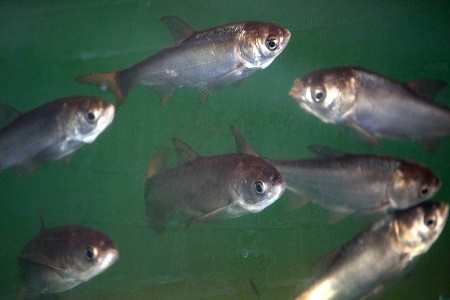
Advancing the government’s effort to prevent Asian carp from invading the Great Lakes, the U.S. Army Corps of Engineers approved a $778 million dam upgrade plan on Thursday.
Lieutenant General Todd Semonite signed off on a final report for the plan to upgrade a lock-and-dam complex on the Des Plaines River near Joliet, Illinois. The proposal now goes to Congress for final authorization.
The Brandon Road Lock and Dam, located nearly an hour southeast of Chicago, would undergo changes to deter ecosystem-threatening intruders, such as Asian carp, from slipping through and entering Lake Michigan.
Recommended upgrades include installation of an electric fence, sound barriers and air bubble curtains.
If Asian carp were to infiltrate the Great Lakes, it could have a damaging impact on marine life and the region’s $7 billion fishing industry, according to research conducted by agencies such as the National Oceanic and Atmospheric Association and the Department of Natural Resources.
The Army Corps said various alternative methods to stop the invasive species from funneling into Lake Michigan were evaluated before the dam upgrade plan was approved Thursday.
The agency opted for technological upgrades, including underwater sound devices and cables that create uncomfortable electrical fields to deter nuisance fish species from entering the Brandon Road Lock approach channel.
Asian carp were introduced into the Mississippi River in the 70s by the flooding of nearby aquatic farms, where the bulky fish were used to control weeds and parasite growth, according to the National Park Service.
Collectively known as Asian carp, black carp, grass carp, bighead carp and silver carp excelled in their pest-management jobs, but their insatiable appetite poses a threat to non-native habitats where these fish could out-compete native species, according to the Park Service.
The Des Plaines River, with its mouth open to Lake Michigan, connects to the Mississippi River through the Illinois River, creating a cross-country route for nuisance species.
According to the Illinois Department of Natural Resources, Asian carp have multiplied greatly in state waters, resulting in an alarmingly dense population and a growing threat to the Great Lakes.
In 2010, an operation led by the Department of Natural Resources resulted in 60 tons of Asian carp removed downstream, mostly with massive nets. Since, these fish have been used in various products including concrete and fertilizer, and commercial fishermen are encouraged to harvest the invaders.
Thursday’s plan is supported by the department’s research, which highlights a need to focus on downstream, breeding populations before they can multiply in the Great Lakes.
